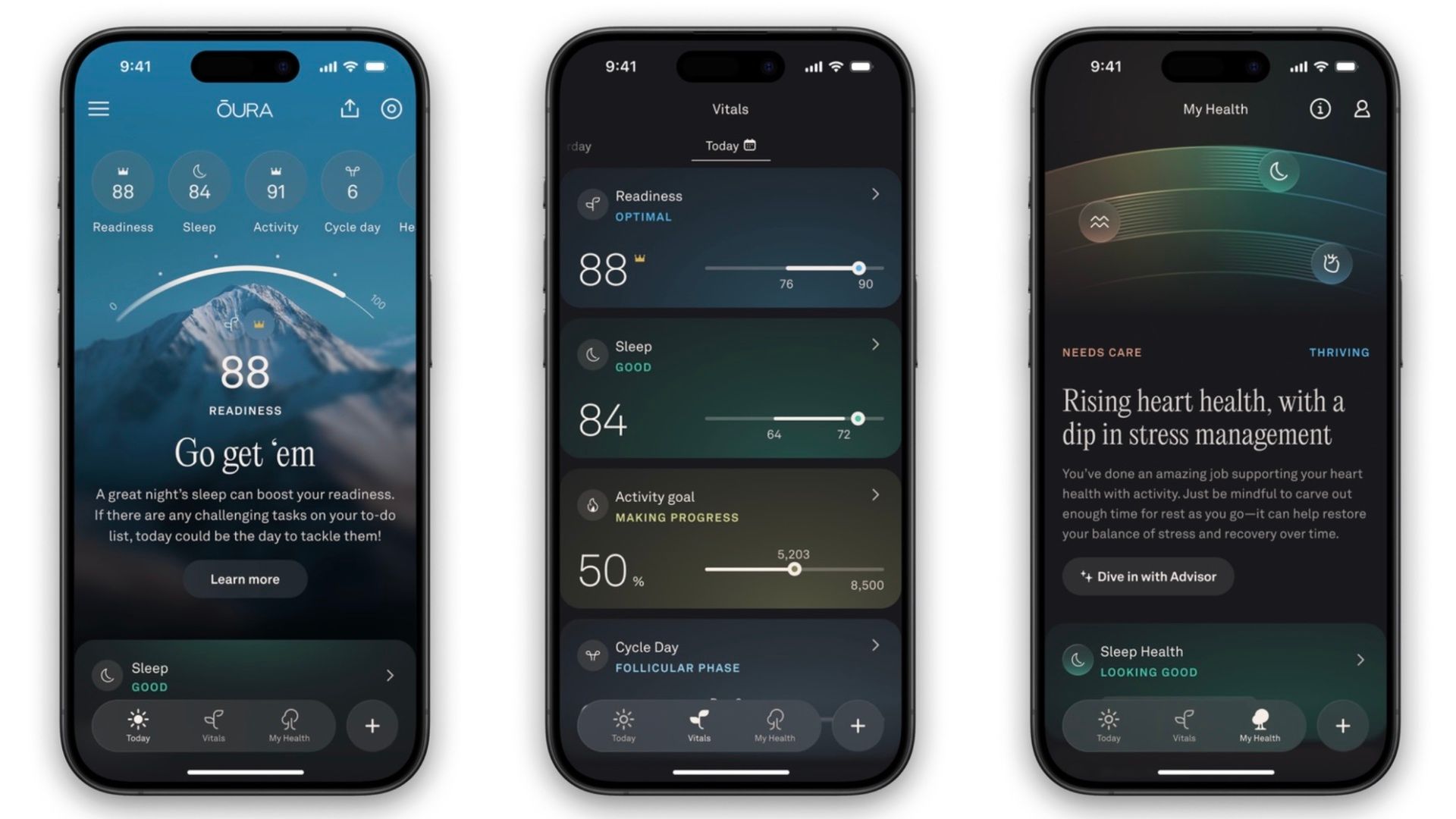- Increadible
- Posts
- Oura can now detect a meltdown (yours)
Oura can now detect a meltdown (yours)
iRace: coming soon to your iPhone? Science just cured blindness (sort of).

Good morning.
It’s Tuesday, October 21. The city’s glowing under that too-bright fall sun—the one that tricks you into thinking you don’t need a jacket, then laughs when you shiver ten minutes later. On this day in 1959, crowds lined up along Fifth Avenue to see a strange white swirl of concrete that looked more like a frosted cupcake than a museum. It was the grand opening of the Guggenheim—Frank Lloyd Wright’s architectural rebellion and New York’s newest art temple. Some called it genius, others called it an eyesore. Either way, it made everyone look.
So here’s to Tuesdays that make no sense but still look iconic. Have a good day, and try not to spiral—leave that to the Guggenheim.
Today’s stories:
Microchip implants give blind patients sight back
Walmart’s done renting—it’s buying the mall
Anthropic’s Claude gets a nuke-free update
Pokémon fans get a luxury NYC playground
Thieves steal royal jewels in seven minutes
Robinhood wants to be your baby’s broker
Oura now tracks your mental breakdown
Apple just bought speed for your screen
Waymo’s robotaxi ignored a school bus
Meta’s paying Gen Z real adult money
Steve Jobs just made it onto money
and more…

Wall Street kicked off the week in rally mode as traders geared up for a flood of big-name earnings and long-awaited inflation data.
The Dow jumped more than 500 points (up 1.1%), while the S&P 500 gained just as much and the Nasdaq climbed 1.4%, boosted by Apple, which hit a record high on hot iPhone 17 demand. Investors are brushing off economic jitters for now and turning their attention to earnings season — with Tesla, Intel, Netflix, and Coca-Cola all stepping into the spotlight this week.
_____
Robinhood Is Raising the Next Generation of Traders
Robinhood is done chasing meme stocks—it’s now chasing babies. The trading app that turned investing into a video game is entering its “responsible adult” era, rolling out retirement accounts, savings products, and plans to manage $1,000 government-funded investment accounts for every newborn starting in 2026. Yes, Robinhood wants to be your baby’s first broker. After years of chaos—meme stock meltdowns, congressional hearings, and a CEO apology tour—Robinhood’s back on top. Thanks to the Trump rally, its stock is up 500% since Election Day, and it just landed in the S&P 500. Now it’s trying to convince regulators it’s mature and persuade Gen Z that trading stocks and betting on Oscar winners can coexist. With salaries low, rent high, and dopamine cheap, Robinhood’s betting it can sell financial literacy and instant gratification in one swipe.
_____
Walmart is collecting shopping plazas. Walmart isn’t renting anymore—it’s buying the whole mall. The retail giant dropped $44 million on a shopping plaza in Norwalk, Connecticut, grabbing not just its own store but the entire strip—Ulta, Panera, Qdoba, and the rest. Being a tenant was too basic; Walmart’s now the landlord. It’s the third shopping center it’s scooped up this year. Owning half of retail apparently wasn’t enough. For shoppers, nothing really changes—same fluorescent lights, same rollback prices—just now on Walmart-owned turf. Monopoly, but in real life.
Apple buys Formula 1. Apple just bought the rights to speed. Starting in 2026, every Formula 1 race—practice laps, sprints, and all—will stream on Apple TV as part of the regular $12.99 subscription. No extra passes, no ads, just pure engine noise and billion-dollar sponsorships. The five-year deal reportedly costs Apple around $140 million per year, nearly double what ESPN was paying. F1 fans can still use F1 TV Premium, but now it’s bundled into Apple’s ecosystem—because of course it is.
Meta’s hiring Gen Z—and actually paying them. The job market’s brutal for new grads—entry-level roles are disappearing, managers side-eye Gen Z, and AI keeps replacing humans faster than HR can post job listings. But Meta’s still hiring, and it’s ready to throw real money at new talent. The $1.8 trillion tech giant is recruiting full-stack and product software engineers. Applicants need a bachelor’s degree in something like computer science or engineering and some proof of coding experience—think Python, C++, React, or a university project that didn’t crash. The salary range lands between $176K and $290K, with bonuses, equity, and benefits. Remote work isn’t on the table; Meta wants bodies in chairs at its Washington or California offices. Silicon Valley nostalgia, but with better snacks.

Oura’s New Feature Measures How Close You Are to Losing It
Oura just went from tracking sleep to diagnosing your existential crisis. The company rolled out a shiny new app and a Cumulative Stress feature that basically tells you how close you are to snapping. It measures your burnout using data from your sleep, heart rate, temperature, and even those little midnight twitches you pretend are “restless dreams.” The redesign comes with three tabs: “Today” for your daily reality check, “Vitals” for your body stats, and “My Health” for long-term proof you need a vacation. The menstrual tracker now covers a full year—because one month of chaos wasn’t enough. Next up, Oura’s gunning for FDA approval to predict blood pressure and hypertension before your doctor gets the memo. The ring started by telling you how you slept. Now it wants to tell you how you’ll die.
_____
Blind patients see again thanks to eye implants. Science just gave eyesight a reboot. Five blind patients in London can now read again after receiving microchip eye implants at Moorfields Eye Hospital. Each chip is the size of a grain of rice and thinner than a human hair—basically, tech for your eyeballs. The device works with special glasses that beam images to the implant, which then sends signals to the brain. Patients spent months training their brains to interpret the new visuals, and now they’re reading, doing crosswords, and crying happy tears over it. It’s a breakthrough for people with advanced macular degeneration, a disease that destroys central vision. For now, only a few have access—but it’s the closest thing yet to giving sight a software update.
Federal regulators ground Waymo’s bad robot. Waymo’s self-driving car just pulled the one move guaranteed to make humans lose their minds—it drove around a stopped school bus with its red lights flashing. The stunt, caught on video in Atlanta, earned the robotaxi a shiny new federal investigation from the National Highway Traffic Safety Administration. Regulators say they’re looking into how Waymo’s software handles school buses and suspect this isn’t the first time one of its cars decided to improvise. Waymo blamed the incident on “visibility issues” and claimed the car didn’t see the flashing lights or the stop sign—classic robot excuse.
Anthropic teaches its chatbot not to end the world. Anthropic says its chatbot, Claude, won’t help anyone build a nuclear bomb. The AI company teamed up with the U.S. Department of Energy and the National Nuclear Security Administration to make sure of it—because apparently that’s where we are now. They tested Claude inside a top-secret Amazon cloud (yes, that Amazon) and built a “nuclear classifier,” basically a filter that blocks bomb-related conversations. It spots dangerous topics without flagging innocent ones like nuclear energy or medicine. Anthropic calls it a proactive safety system; critics call it security theater. Experts say it’s nice PR, but if Claude never had access to nuclear data, the “nuke-proof” label is just for show. Still, Anthropic wants the whole AI industry to adopt it as a safety standard—because nothing says “trust us” like a private company policing nuclear knowledge.

It's not you, it’s your tax tools
Tax teams are stretched thin and spreadsheets aren’t cutting it. This guide helps you figure out what to look for in tax software that saves time, cuts risk, and keeps you ahead of reporting demands.

Louvre Robbed in 7 Minutes Flat
Thieves pulled off a seven-minute heist at the Louvre, stealing “priceless” jewels from France’s Crown collection like it was a Netflix special in real time. The crew used a truck-mounted ladder, broke in through a window with an angle grinder, and hit two high-security cases inside the museum’s Apollo Gallery. They made off with eight pieces, including tiaras and necklaces once worn by French queens, leaving behind only a damaged crown (even thieves get clumsy under pressure). The haul included emeralds, diamonds, and enough history to make Napoleon roll in his tomb.
_____
Steve Jobs is on a dollar. Steve Jobs is officially money now—literally. The U.S. Mint just revealed new 2026 $1 coin designs, and one of them features a young Jobs in his signature turtleneck, sitting cross-legged like he’s about to pitch the iPhone to God. The coin’s part of the American Innovation series, which started in 2018 and celebrates, well, people who made stuff. Also featured: the Cray-1 supercomputer. Don’t expect to find it in your change jar though—these are collector coins, not for vending machine use.
The Pokémon store you didn’t know you needed. Poké Court is going pro. The cult-favorite Pokémon card shop is opening a massive 2,000-square-foot flagship in NYC’s Meatpacking District this November. What started in founder Courtney’s spare bedroom has evolved into a full-blown collector paradise: a “Pack Bar” where “Packtenders” help you pick and open cards like sommeliers for nostalgia, card walls stacked with rare pulls, and a VIP lounge for those who take Pokémon way too seriously. Poké Court isn’t just selling cards anymore, it’s selling childhood dreams, wrapped in penny sleeves and premium rent.
_____
TikTok of the day: watch here
What do you think about today's edition? |
We wanna be friends with your friends
Share Increadible Newsletter (increadible.com) with your friends and stay informed anxiety-free together







